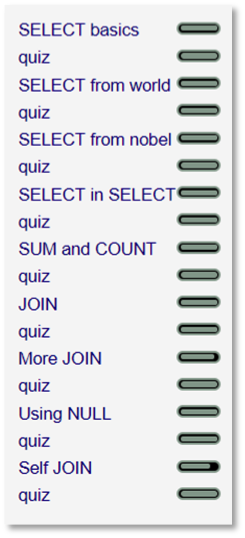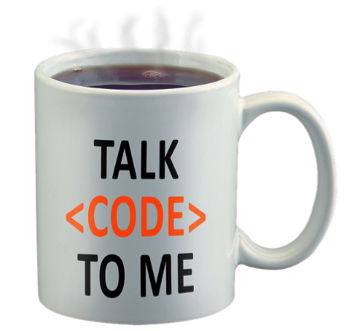
I'm a tech writer. Not a programmer. And until a short time ago, I had never written a single line of code in my life. But then something changed: SQLBot challenged me to review SQLZoo's Structured Query Language course…
SQLZoo is a free, "learn-by-doing" SQL course that has you punching out queries and wracking your brain for the solutions from the very beginning. It's fun (if you like puzzles), but more importantly: Does SQLZoo teach you what you need to know?

Long story short, I completed the course and have the green bars of progress to prove it. If you want to know if I actually learned SQL, keep reading. In this review I'll cover the following:
- What's SQLZoo?
- What's It Like to Learn SQL with SQLZoo?
- Tips for getting the most from the course
- How long does SQLZoo take to finish?
- But will SQLZoo teach me to code in SQL?
1) What's SQLZoo?
Before I started SQLZoo, I dug around for some information on the course—while looking for a ray of hope to motivate me to finish it! The problem was, SQLZoo doesn't make any promises on their website except that they offer " tutorials and reference to support people learning SQL" and " everyone in the world is welcome to use our site and the material on it in any way they see fit."
Then I found the words of inspiration I was looking for (from a Quora data science manager):
I highly recommend SQLZoo at SQLZOO. The exercises are interactive, and they will walk you through the basics of writing SQL queries, including selects, aggregations, and various kinds of joins. The best part is that you get to run the SQL queries live.
I'd recommend it for both learning SQL from scratch and refreshing SQL.
—William Chen, Former Data Science Manager at Quora
Digging deeper, I discovered that SQLZoo is anything but "new." Most SQL veterans know it's the "old-school" way to learn Structured Query Language. In fact, SQLZoo.net has been around—and experienced numerous revisions and modernizations—since the dialup internet days of 1999.
The SQLZoo folks are a pretty funny too. They refer to their SQL systems as "inmates," while assuring novice users they're not dangerous. According to SQLZoo:
They have been tamed, caged and defanged so that members of the public can pet them or poke them or gawk at them. In the wild, these engines are dangerous, needy beasts but in the confines of SQLzoo they are relatively safe. Once you have an idea of what SQL is and how it works you should install an SQL engine on your own computer and play with the real thing.
Last but not least: SQLZoo is free! Considering that SQL coders earn an average salary of $70k in the U.S. (and sometimes more than $100k). SQLZoo is offering an extremely valuable service.
- So far so good. SQLZoo was offering:
- A thoroughly-recommended SQL course.
- A long-standing reputation of being the "tried-and-true" way to learn SQL.
- A sense of humor.
- A tremendous value to everyone in the world (for free)
I was ready to take the plunge.
2) What's It Like to Learn SQL with SQLZoo?
The SQLZoo course features nine primary lessons that take you from easy-beginner to brain-destroyingly-complicated in no time. Here's the format:
- SELECT basics, quiz
- SELECT from world, quiz
- SELECT from nobel, quiz
- SELECT in SELECT, quiz
- SUM and COUNT, quiz
- JOIN, quiz
- More JOIN, quiz
- Using NULL, quiz
- Self JOIN, quiz
The course is an immersive, learn-it-by-doing-it format. From the start, you'll be typing code, clicking submit, and hoping that your queries produce the correct answer. When you get it right, a smiley face appears:
Each lesson includes ten or more exercises like this:

4) How Long Does SQLZoo Take to Finish?
The one thing I wanted to know most before starting SQLZoo was: How long is this going to take? In the end, SQLZoo took me 18 to 20 hours of study time to complete. I wasn't moving fast, and I wasn't "on-task" during all those hours (I took a few coffee breaks!).
Basically, if you had to finish the course in a weekend, you could hunker down and do it. Your head will be buzzing with INNER JOINs and WHERE clauses. You'll be lost in infinite loops of nested SELECT statements. And you'll be dreaming of perfect queries and infinite datasets. But in the end, SQLZoo will teach you several university courses worth of material in no time.
5) But Will SQLZoo Teach Me to Code in SQL?
SQLZoo will teach you the foundations and basics of SQL—on top of some very advanced skills. You'll have the tools required to write complex queries and create, edit, update and modify databases. This will serve as a stepping stone toward mastery. In fact, after finishing SQLZoo, I took a SQL skills assessment test from w3schools.com and this was the result:

I'm not a SQL expert or guru (yet). But the fact I scored 100% on this test says a lot for the SQLZoo course. I was a complete "newbie" before taking it, and all I did was proceed through the lessons, step-by-step without any additional coursework or studying—just a fair amount of banging my head against the wall.
Going through SQLZoo reminded me of learning a foreign language. At first, you're stretching your brain to understand the simplest of concepts, but before you know it, things start clicking together. In the meantime, SQLZoo has given me a command of SQL that's good enough to write (what seems to me like) intermediate-level queries.
By the time you finish the lessons, you'll have an excellent understanding of nested SELECT statements, INNER JOINs, LEFT and RIGHT JOINs, SUMs and COUNTs, ORDER BY, COALESCE and you'll also be able to update, modify and create new databases.
6) Tips for Getting the Most from SQLZoo
There's something you need to prepare for with SQLZoo: You'll get stumped a lot. This is an important part of the learning process because it forces you to think hard and troubleshoot your queries. However, the difficulty level could be discouraging, so it's important to stay focused. With that in mind, here are some tips for getting the most out of SQLZoo:
- Complete the auxiliary practices and watch the videos: Within each lesson, you'll find auxiliary practice—as well as videos and tiny amounts of explanatory text. The text and videos are valuable (even if they're a little boring). Don't skip them. I tried that and had to backtrack to catch what I missed.
- Complete the "reference/how-to" section: This section explains how to create, update, edit, delete and make changes to your databases. Very important! I found this out the hard way. I thought I was done with the course after finishing the nine primary lessons. Then I failed an SQL assessment test. I went back to complete these sections, and found all the information I was missing.
- It's okay to cheat: Sometimes your SQLZoo query will fail no matter what you do. If that happens just add "?answer=1" to the end of the URL. The answers will display in the text boxes. I had to use that feature quite a few times.
Stay the course. Before you know it, you'll be done!
Want to Use Your New SQL Skills? Do You Use Slack at Work? Impress Your Team With SQLBot!
Learning SQL means you'll have a lot of power at your fingertips. For one, you'll be able to write queries yourself without relying on the business intelligence team. But also, you can take advantage of efficiency-maximizing tools that use SQL.
SQLBot, the product from the team that challenged me to learn SQL, is one of those tools. SQLBot links your SQL database system to your Slack account, so you can query your company's database from your smartphone. Not only that, but SQLBot lets you schedule queries for specific times—daily, weekly, monthly, etc.—and have the results pushed to your team by email or slack automatically.

About the Author
Jeremy Hillpot is a freelance writer who writes about software and technology
Fascinated by emerging technologies and the laws and market trends that follow them, Jeremy Hillpot's background in consumer-investor litigation provides a unique perspective on topics like data science, investments, cryptocurrency and the law.

 By
By
